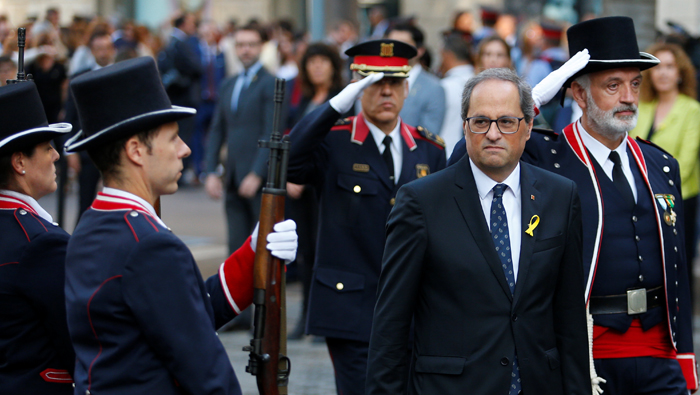
Barcelona: Hundreds of thousands of people are expected to fill the streets of Barcelona on Tuesday for Catalonia's first commemorative day since it unilaterally declared independence last year and pitched Spain into constitutional crisis.
Supporters of splitting the wealthy northeastern region from the rest of the country have in recent years used the September 11 "Diada", the anniversary of the fall of their coastal capital to Spanish forces in 1714, to promote the cause.
This year, Catalonia's leader Quim Torra, who took over from his exiled predecessor after Madrid ended an unprecedented period of direct rule imposed in response to the independence declaration, has called for a mass rally in support of his bid for a binding referendum on secession. "Our government has committed to making the republic a reality," Torra said on Monday in a televised address to mark the occasion.
"Long live free Catalonia."
He wore a yellow ribbon in support of nine activists and politicians jailed for their role in last year's push for independence, a big grievance for pro-secession Catalans.
Torra's administration relaunched its campaign to split from Spain last week.
"A supposedly democratic state should allow a vote with an agreed referendum and without police violence," regional government spokeswoman Elsa Artadi said on Tuesday.
But divisions over the question of secession are stark in Catalonia, which makes up around one fifth of Spain's economic output and already has a high level of autonomy in areas including education and health, and its own police force.
A poll by the Centro d'Estudis d'Opinio in July showed 46.7 per cent of Catalans saying they wanted an independent state while 44.9 per cent did not.
Albert Rivera, the fervently pro-unionist, Barcelona-born head of the Ciudadanos political party, said the Diada should be a day of celebration for all Catalans.
"But the pro-independence lobby has taken it over and turned it into a day of exclusion, hatred and attack on Spain," he said on Twitter.
Socialist Prime Minister Pedro Sanchez, who took power in June, has taken a softer approach to arguably the thorniest issues in Spanish politics than his conservative predecessor Mariano Rajoy, but he has stood firm against allowing a vote on secession, or any unilateral attempt by Catalonia to secede.
Last year's Diada, in which marchers often climb on each other's shoulders to form human towers, took place days before the regional government held a referendum in defiance of Madrid, which ultimately sent riot police to try to stop the vote.
Torra's predecessor and ally Carles Puigdemont then declared independence, prompting Madrid to impose direct rule on the grounds that Barcelona had violated the 1978 constitution which states that the country is indivisible.
Extra police will be deployed during the independence bid anniversaries.
The government's regional delegate, asked last week about 600 agents being sent as reinforcements, said this was the normal approach to scheduled rallies.
Last year's banned referendum delivered a majority vote for independence, but turnout was low.
A pro-secession coalition regained control of the regional parliament in an election in December, but the staunchly pro-union Ciudadanos emerged as the single biggest party.